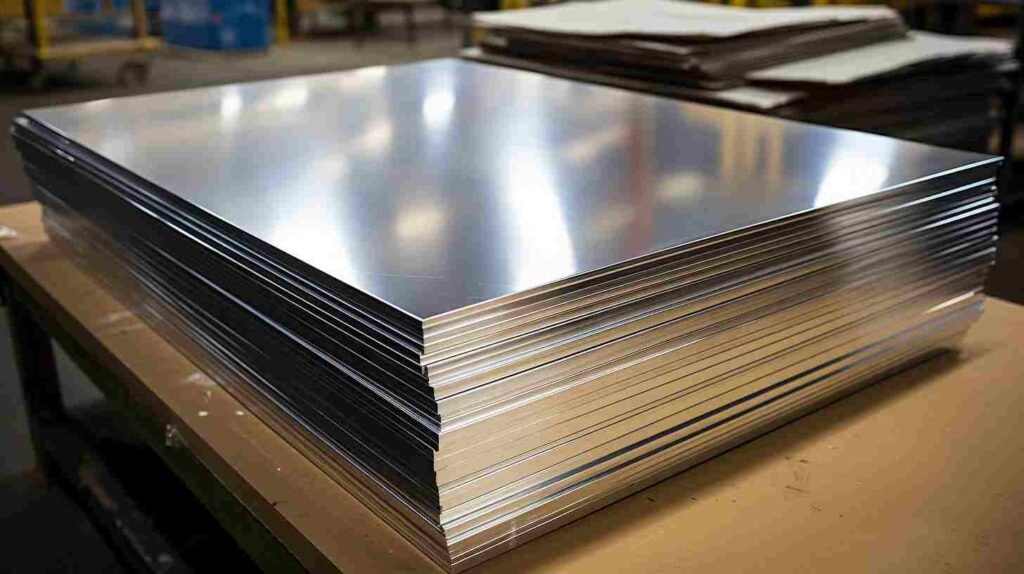Introduction to Aluminum
Aluminum is preferred for precision sheet metal fabrication because of its lightweight properties and malleability. However, it’s essential to highlight that not every aluminum alloy is ideal for sheet metal parts. Some high-strength aluminum grades may tear or fracture during bending, especially when there’s a significant gap between their yield and tensile strengths. Being one of China’s leading B2B sheet metal fabrication parts manufacturers, Shengen frequently uses some of the most common and effective grades of aluminum for producing custom parts for global industries.

Sheet Metal Aluminum at a Glance
| Application | Aluminum is versatile, finding its place from initial design concepts and prototypes straight through to the demanding environments of the automotive and aerospace sectors. |
|---|---|
| Advantages | It offers a favorable balance of strength and weight, boasts commendable mechanical characteristics, and presents superior malleability. |
| Disadvantages | Welding challenges persist, certain alloys may resist forming effectively, and costs can fluctuate markedly based on the specific alloy chosen. |
| Minimum Lead Time | 3 days |
| Standard Tolerances | 1.0 degree tolerances are possible on bent features and a cutout accuracy of +/- 0.020 in (0.508 mm) |
| Sheet Thickness | Maximum of 3/8 in (9.525mm) and a minimum of 0.0126 in (0.32 mm) |
Aluminum 5052
Magnesium is the dominant alloying element in this aluminum alloy. Owing to the absence of copper, Aluminum 5052 showcases superior corrosion resistance. While it doesn’t lend itself to heat treatment, it is the strongest among the non-heatable alloy categories. When compared to the series three alloys, its formability is notably superior. Typical applications include highway signs and fuel storage tanks.
Aluminum 5052 Standard Gauges
Material
Aluminum 5052 H32
Standard Sheet Thicknesses
0.020”, 0.025”, 0.032”, 0.040”,0.050”, 0.063”, 0.080”, 0.090”, 0.100”, 0.125”, 0.160”, 0.188”, 0.250”, 0.375”, 0.500”
Aluminum 5052 Properties
Tensile Strength, Yield (MPa)
193
Shear Modulus (GPa)
117
Elongation at Break (%)
18
Hardness (Brinell)
60
Density (g/cm^3)
2.68
Aluminum 6061
Aluminum 6061 stands as a quintessential “all-rounder” in aluminum alloys. Its core alloying components comprise magnesium and silicon, making it receptive to heat treatments. However, caution is advised when bending Aluminum 6061 post-high-tempering stages, as it becomes prone to fractures. This alloy is suitable for sheet metal components but demands meticulous attention and pre-treatment.
Aluminum 6061 Standard Gauges
Material
Aluminum 6061 T6
Standard Sheet Thicknesses
0.016”, 0.020”, 0.025”, 0.032”, 0.040”, 0.050”, 0.063”, 0.080”, 0.090”, 0.100”, 0.125”, 0.160”, 0.190”, 0.250”, 0.313”, 0.375”, 0.500”, 0.625”, 0.750”, 0.750”, 0.875”, 1.000”
Aluminum 6061 Properties
Tensile Strength, Yield (MPa)
276
Shear Modulus (GPa)
96.5
Elongation at Break (%)
17
Hardness (Brinell)
95
Density (g/cm^3)
2.7
Finishes
Dive into the rich tapestry of finishes available for aluminum sheet metal, each meticulously designed to meet distinct needs.
Anodizing: Elevate aesthetics and resistance with this top-tier finish. Choose between regular and the more durable hard-coat, making your aluminum parts not just beautiful, but also resilient.
Metal Plating: Boost corrosion defense and wear protection. With methods like electroplating and electroless plating, aluminum can don coats of tin, nickel, or even precious metals like gold and silver. Discover the unmatched perks of each plating.
Powder Coating: Seeking vibrant color with enhanced protection? Powder coating offers an amalgamation of visual appeal and reinforced resistance, turning ordinary aluminum into extraordinary.


Cost-saving Design Tips
Optimal Material Selection: Not all metals created for sheet metal fabrication are equally cost-effective and efficient. Prioritize understanding the specific requirements of your project. While some metals excel in certain conditions, they may falter in others. A comprehensive understanding of their reactions in diverse environments can be crucial. Consult with a Fabrication Pro for insights.
Adherence to DFM: Embracing the DFM (design-for-manufacturing) ethos is pivotal when sketching out designs for sheet metal parts. Familiarize yourself with essential design principles to harness the full potential of fabrication methods without inflating costs.
Get A Free Quote
Contact us to get a free quote and more expertise about sheet metal fabrication. Your project will meet the right solution with Shengen.
Custom Sheet Metal Fabrication with Easy
At Shengen, We turn complex Into Simple! Follow the following three steps to start today!
- Tell us as specific as possible of your needs, provide the drawing, reference picture and share your idea.
- We will work on the best solution according to your requirements and drawing, the specific quote will be provided within 24 hours.
- We will start mass production after getting your approval and deposit, and we will handle the shipment.
